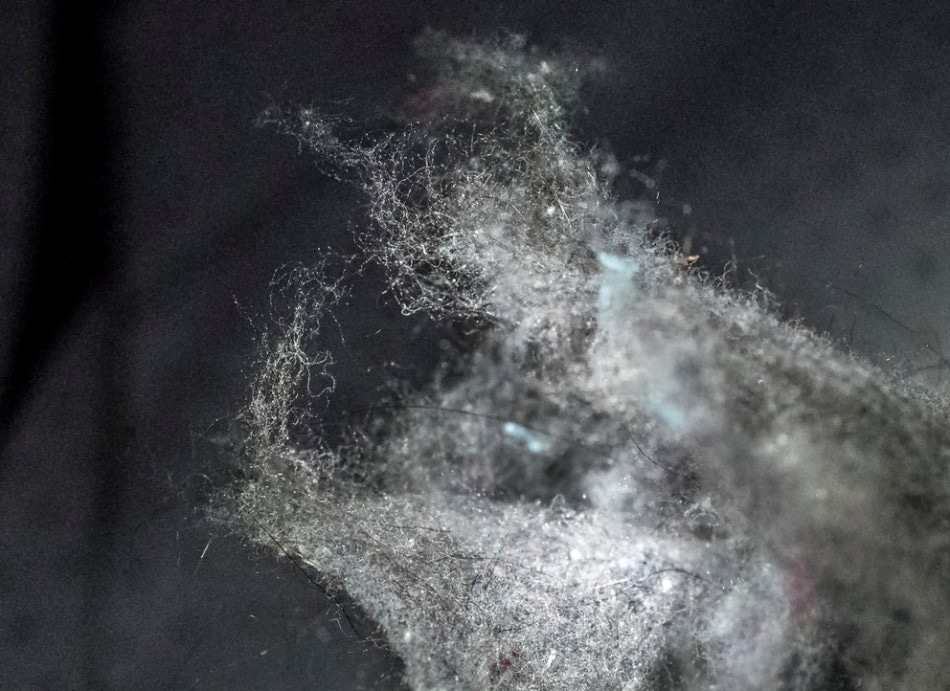Feb 18 2019
Despite the polyester leisure suit being a 1970s mistake, polyester and other synthetic fibers such as nylon are still in use, and are a huge contributor to the volume of microplastics in the environment, according to a materials scientist from Penn State University (PSU), who suggests swapping to biosynthetic fibers to resolve this issue.
 A close-up of synthetic and other fibers in lint. (Credit image: Patrick Mansell/Penn State)
A close-up of synthetic and other fibers in lint. (Credit image: Patrick Mansell/Penn State)
These materials, during production, processing and after use, break down into and release microfibers that can now be found in everything and everyone.
Melik Demirel, Lloyd and Dorothy Foehr Huck Endowed Chair in Biomimetic Materials, PSU.
In contrast to natural fibers like cotton, wool, and silk, current synthetic fibers are petroleum-based products and are typically not biodegradable. While natural fibers can biodegrade and be recycled, composite fibers that are made up of natural and synthetic fibers are tough or expensive to recycle.
Islands of floating plastic waste, which can be seen in the oceans, are a visible problem, but the pollution generated by textiles is invisible and universal. In the oceans, these microscopic plastic particles become integrated into animals and plants. Harvested fish contain these particles, and when people consume them, they consume the microplastic particles as well.
Demirel proposed four probable approaches to solving this issue at the 2019 yearly meeting of the American Association for the Advancement of Science in Washington, D.C on February 16th. The first is to curtail the use of synthetic fibers and shift back to natural fibers such as wool, silk, cotton, and linen. However, synthetic fibers are less costly and natural fibers have other environmental costs, such as land-use and water issues.
Since a major portion of the microfiber load that ends up in water sources originates from laundering, he advocates aftermarket filters for washing-machine outflow hoses. Clothes dryers come with filters that trap lint—also microfiber waste—but present-day, front-loading washing machines mostly do not.
“Capturing the microplastics at the source is the best filtering option,” said Demirel.
He also is aware that bacteria that eat plastics are present, but are, at the moment, in the academic research stage, which will take a while to gain industrial momentum. If bacteria were used at a greater scale, they could break the fibers down to be reused or aid in biodegradation of the fibers.
While these three options have potential, they do not solve the issue of the tons of synthetic fibers presently used in clothing worldwide. Biosynthetic fibers, a fourth option, are both biodegradable and recyclable and could directly swap for the synthetic fibers. They could also be mixed with natural fibers to offer the durability of synthetic fibers but allow the mixtures to be recycled.
Biosynthetic fibers are derived from natural proteins, and can also be influenced to possess necessary characteristics. Demirel, who created a biosynthetic fiber made up of proteins similar to silk but inspired by those found in squid ring teeth, indicates that by varying the number of tandem repeats in the sequencing of the proteins, the polymers can be changed to match a range of properties.
For instance, a material made from biosynthetic squid ring-teeth proteins, called Squitex, is self-healing. Broken fibers or sections will reattach with water and minimal pressure, and improve the mechanical properties of recycled cotton as a blend. Furthermore, as the fibers are organic, they are totally biodegradable as well.
The Army Research Office, Air Force Office of Scientific Research and the Office of Naval Research supported the research to create the squid-inspired biosynthetic material. Demirel is the co-founder of a company planning to market Squitex.